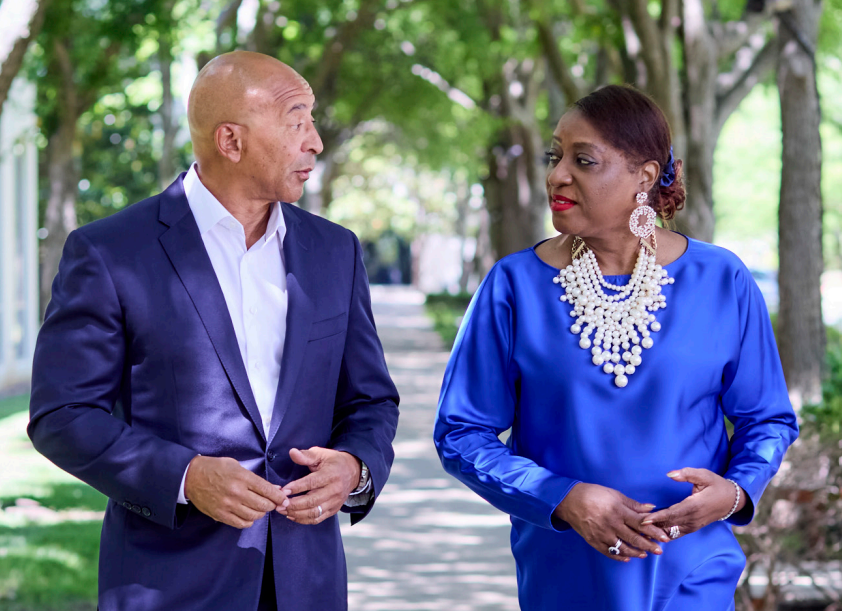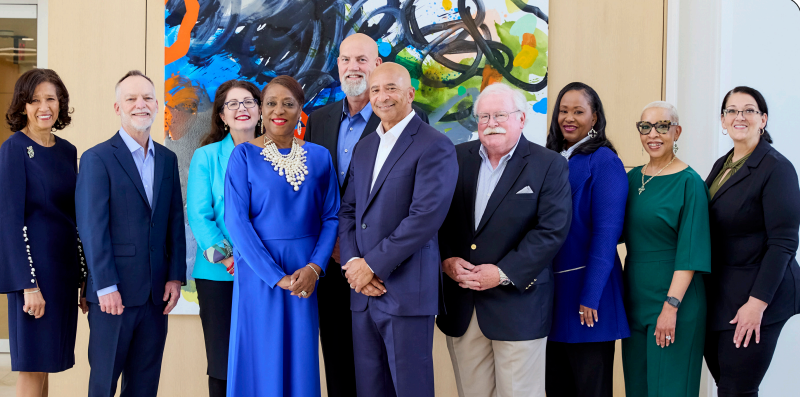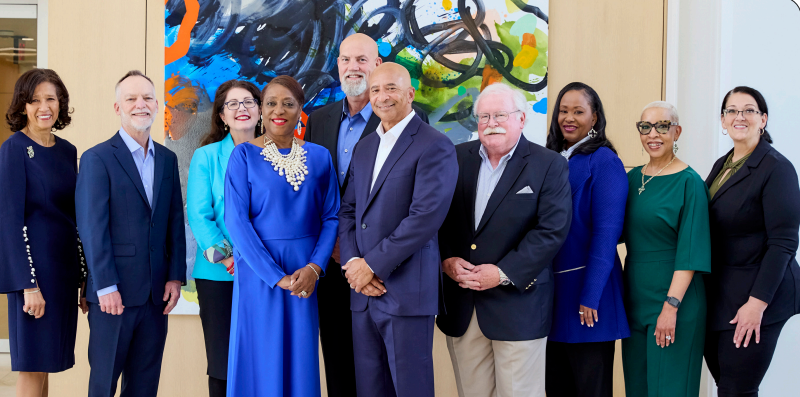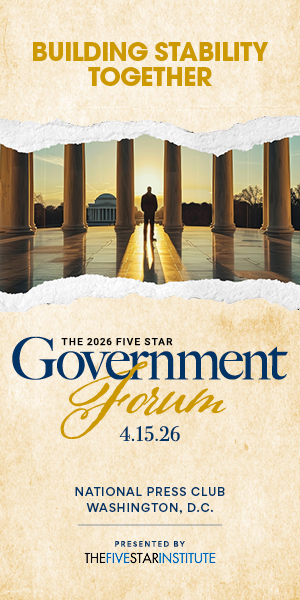This piece originally appeared in the June 2024 edition of MortgagePoint magazine, online now.
VRM Mortgage Services is a company born during a very different era for our industry. The company—was established “to provide portfolio managers with reliable and high-quality outsourcing services to manage their REO assets”—launched just before the 2007-2008 financial crisis, a time when REO inventories were abundant as the nation navigated wide-spread foreclosures, bank collapses, and economic strife. The fact that VRM has not only survived but thrived during the ensuing decade-and-a-half is a testament to its leadership, in the form of President & CEO Keith Murray and EVP & COO Dr. Cheryl Travis-Johnson.
is a company born during a very different era for our industry. The company—was established “to provide portfolio managers with reliable and high-quality outsourcing services to manage their REO assets”—launched just before the 2007-2008 financial crisis, a time when REO inventories were abundant as the nation navigated wide-spread foreclosures, bank collapses, and economic strife. The fact that VRM has not only survived but thrived during the ensuing decade-and-a-half is a testament to its leadership, in the form of President & CEO Keith Murray and EVP & COO Dr. Cheryl Travis-Johnson.
Keith founded the company in 2006 and Dr. Travis-Johnson joined in 2008. Under their leadership, Murray and Travis-Johnson went on to grow VRM Mortgage Services into an industry stalwart, offering services ranging from REO asset management and property preservation to inspections, title and closing coordination, commercial and rental asset management, and eviction management services. Today, the company boasts of having “listed, marketed, managed, and sold over 700,000 properties.”
The company launched VRM University (VRMU) in 2009, offering “specialized training for financial services and real estate professionals.” Having partnered with the Council for Inclusion in Financial Services (CIFS), VRMU’s courseload offers online trainings, webinars, and other educational resources providing certifications in topics such as Inclusive Workplace Dynamics, Broker Price Opinion (BPO) Training, Property Preservation and Maintenance, and REO Training.
“The VRMU platform is one in which we take professionals in a marketplace that have the expertise to do the work but have not yet had the opportunity to work with corporate sellers,” explained Murray.
MortgagePoint had a chance to sit down with Murray and Travis-Johnson to discuss the keys to VRM’s longevity, their vision for the company, and how the origins of both VRM and its affiliate, PCV Murcor, but also in a time when Murray unexpectedly found himself staring down the barrel of a gun.

A Moment of “Total Clarity”
Murray began his career in banking, working as a teller and account counselor before joining an appraisal training program at the now-defunct Home Savings of America. However, larger global economic forces would soon interfere with this career arc, with the 1980s recession sending out ripples that, among other things, sent many appraisers such as Murray back onto the teller lines.
“I had a full-circle moment in my career after only 14 months,” recalled Murray. At the time, Murray might well have considered this a career setback, but it also put him on the path toward a defining moment that would pivot him onto a brand-new path. Unfortunately, that pivot point was on the other side of a gun barrel. In 1980, while working as a teller at a bank in Los Angeles, Murray was held up at gunpoint. It’s the sort of traumatic moment that would rattle anyone, but in Murray’s case, he says it provided him with a moment of “total clarity.” He decided that whatever life may have in store for him beyond that day, he wanted to play a larger role in shaping his own path, so he decided to start a business.
“That birthed our affiliate company, national appraisal management company, PCV Murcor, which is celebrating over 40 years in business,” Murray said. But that incident and Murray’s ensuing epiphany may have led to very different places had his new path not eventually intersected with that of Dr. Cheryl Travis-Johnson. She came by her career in financial services naturally, with her mother having worked in the banking industry.
Having earned a scholarship from Home Savings of America, Travis-Johnson soon landed an internship working in Crocker National Bank’s marketing department.
“They were the first ones to introduce a secured line of credit for home mortgages,” recalled Travis-Johnson, who worked on the team responsible for marketing that product. This opportunity meshed well with Travis-Johnson’s long-standing interest in the housing industry, fueled by her experiences seeing how important homeownership had been to her father.
“My father had so much pride in being a homeowner, and that enlightened me about community, the sense of ownership, and the American dream,” Travis-Johnson said. “Being a child of the ‘60s, that was a big thing for African Americans to be able to own a home.”
She recalled that virtually all of her early-career mentors worked in the housing industry, and positions at First Interstate Bank and World Savings (where she worked as an operating manager, and then moved to auditing) eventually led her to meet Murray while working at Cendant Asset Services.
Admiring that Murray’s background in the appraisal field meant he was someone “who understands value,” Travis-Johnson recalled that Murray seemed to be someone “who understood all the problems that started happening with the 2006 book of business. [His company, PCV Murcor] was one of the few valuation companies that you didn’t hear any bad things about.”
After listening to Travis-Johnson’s pitch for what would become VRM, Murray told her, “You better get over here and help me grow this,” after she applied for the role.
 The VRM team: Left to Right: Dr. Phyllis Wright–SVP, Human Resources; Joe Morrow–SVP, Default Servicing; Dawn Haghighi–Registered In-House Counsel (General Counsel); Dr. Cheryl Travis-Johnson–COO/EVP; Brad Blancett–VP, Operations; Keith Murray–President/ CEO; Jon Van Deuren–CFO; Alzora Baker–VP, Originations; Tiffany Fletcher–SVP, Compliance and Operations Support; Leigh Gibson–VP, Strategic Initiatives (Not pictured: Larry Hudnall–SVP, Corporate Relations, Clifton Wallace–SVP, IT)
The VRM team: Left to Right: Dr. Phyllis Wright–SVP, Human Resources; Joe Morrow–SVP, Default Servicing; Dawn Haghighi–Registered In-House Counsel (General Counsel); Dr. Cheryl Travis-Johnson–COO/EVP; Brad Blancett–VP, Operations; Keith Murray–President/ CEO; Jon Van Deuren–CFO; Alzora Baker–VP, Originations; Tiffany Fletcher–SVP, Compliance and Operations Support; Leigh Gibson–VP, Strategic Initiatives (Not pictured: Larry Hudnall–SVP, Corporate Relations, Clifton Wallace–SVP, IT)
Evolving a Shared Vision
A decade-and-a-half into the idea that was birthed from that conversation, VRM continues to move forward. Murray says that both PCV Murcor and VRM share core focuses on “delivering solutions in communities: getting the best group of leaders together to execute, partnering with vendors across the community, and giving them opportunities to perform.” Both Murray and Travis-Johnson put enormous stock into working with partners who have a stake in the communities they’re serving beyond just profit potential, and that core belief shapes everything that they do.
“If it’s the community that I live or work and worship in, I’m even more connected to it,” Murray said. “Similarly, if you’re selling assets on behalf of corporate owners, as a broker, it would be the same thing, right? If I’m working in my community, I’m incentivized to do the right thing, because I’m supporting our neighborhood.”
According to VRM’s numbers, by the end of Q1 2024, this local utilization of vendors had reached 93%.
“We deal directly with the boots on the ground,” added Travis-Johnson. “That’s how you can make sure you’re utilizing people within the community. There’s pride in that because they live in that community. That house is going to get repaired properly because they have to drive by that house.”
When we asked Murray and Travis-Johnson about their vision for where VRM is headed in the next decade-and-a-half. Murray spotlighted VRM’s commitment to leveraging “the best technology we can get our hands on.” In particular, he detailed his focus on emerging artificial intelligence (AI) tools that will allow the team to make even better use of the data the company has gathered over the years about how to value properties and sell assets.
“We plan to leverage AI and machine learning to help us make decisions more quickly, with more information,” Murray said.
VRM’s focus on education and promoting equity and access also extends to other projects the VRM team is involved with, such as the CIFS, which Travis-Johnson said is focused on financial literacy and “helping small businesses have access to what larger businesses can get their hands on.” Founded in 2017 by Travis-Johnson in partnership with Marques Woods (President & CEO Braycor Inc.), CIFS was another project Travis-Johnson pitched to Murray—and another that he fully supported, coming aboard as President and CEO of CIFS.
The nonprofit’s stated goal is to “increase awareness within the financial services industry of the social and economic benefits of multiculturalism in employment and supplier utilization, while also launching initiatives that promote financial literacy to help all Americans understand how to grow their wealth.”
Travis-Johnson notes that CIFS is a perfect example of the industry coming together for the greater good. “Historically, Auction.com has been one of our biggest donors, and they’re a direct competitor. But we work together because they understand that it’s about community,” says Travis-Johnson. “Sometimes, you have to work hand-in-hand with non-competing services that help communities.”
The VRM Difference
When asked to name some of VRM’s proudest accomplishments, Travis-Johnson initially cites the $90-$100 billion worth of real estate the company has sold over the years. However, her list of victories quickly turns beyond anything purely financial and shifts back to the personal.
“The reputation that we built from when we started is one of integrity, of great business ethics, of high performance, of diversity in thought and leadership and how we show up for communities,” said Travis-Johnson. “We’re a great partner to have.”
Travis-Johnson also points to the prevalence of minority vendors and veteran-owned businesses with whom VRM works, which she says exceeds “all the contractual requirements.”
Per VRM, 49.2% of the company’s network is classified as diverse (Women, Minority, LGBT, Disabled, Veteran-Owned, Small Business Classification, Small Disadvantaged Classification, and HUBZone).
Travis-Johnson also notes that this commitment to diversity extends to the makeup of the company’s internal team—including making those internal and external numbers public.
“When we speak to prospective clients, we share our numbers,” said Travis-Johnson. “This is the number of men, women by race, everything. We’re very open with that. That’s a differentiator to me because it shows that we reflect the communities that we affect.”
Travis-Johnson also speaks proudly of the quality of her team, which includes many veterans of prominent banks and the GSEs. VRM understands its customers, she says, because “we used to be them, and we built our team based on that. Our diversity is not just by race and gender, it’s also a diversity of thought.”
When it comes to how VRM’s leadership team operates, Murray notes that there’s more at work than simply that “diversity of thought”—accountability is also a core focus.
“Within the executive team, we’re oftentimes the ones that hold up our hand and want to call ourselves out rather than maybe holding other folks accountable.” Murray added, “That’s one way to make sure you’re in a continuously improving mindset is if you’re always saying, ‘This didn’t go the way we want it to go.’ How do we deal with it? What’s the root cause? How do we fix it? And let’s not make the same mistake again.”
Travis-Johnson expands upon this philosophy, noting that they tend to “throw the titles out of the room.” When asked to elaborate, she says, “Close your eyes, give me your thoughts, tell me what you’re thinking. We try not to use the titles as an intimidating factor. That way we get the best from our people.”
Travis-Johnson said this philosophy makes the VRM team more comfortable sharing their perspectives with Murray and herself.
“That’s how you get the best out of your people,” Travis-Johnson continued. “They feel valued and appreciated because you are listening. There’s not a person or a company we work with who has never met [Keith] or seen him or heard from him. He does an exceptional job making sure that people feel valued.”
However, both Murray and Travis-Johnson admit that recruiting from larger banks and GSEs can result in a bit of a learning curve for new team members, both because VRM is a smaller company and because of its work philosophy which asks team members to take ownership of projects and think creatively about problem-solving while being constrained by a smaller budget than some of these larger organizations may have had access to.
“Sometimes you have to use your current resources to just get it done,” said Travis-Johnson. “It’s so much easier to just hire a temp or a consultant than to do it yourself. We have learned through this culture that a lot can be done with the resources we already have. It forces you to challenge yourself.”
Murray agrees, noting that “We’re not for everybody. Some folks like to be able to take it to the 20-yard line and hand it off to somebody else. But we say, ‘No, you’ve got it.’ Some people thrive in that environment. [Cheryl] thrives in that environment. Some people don’t. If you want the opportunity to make change and you’re empowered to do it, and you thrive in that, you can be successful here.”
Travis-Johnson points with pride to VRM’s multi-year contracts with both Fannie Mae, Freddie Mac, VA, and Bay View (Community) and notes, “All of that is based on our performance, and that speaks to our people,” Travis-Johnson said.
“It feels so great when I go to conferences and people walk up to me and say, ‘You have the best team.’ Our company was built on customer service.” Murray adds, “It’s having folks that come from different segments of financial services that can all come together to deliver solutions to our customers.”
But what does being “built on custom[1]er service” mean in the practical sense? For Travis-Johnson, she says it starts with sitting down with customers and having a candid conversation—but without it turning immediately into a sales pitch.
“We sit down with our customers. We don’t try to push our products on them. Instead, we ask them, ‘What are your pain points? What do you need? Let us try and craft a solution for you.’ People aren’t used to that. It stuns leaders when I ask that question. They sit back and they’re expecting me to sell them something, and I’ve [countered by saying], ‘You need to tell me your problem so I can fix it.’ Otherwise, we don’t need to do anything other than have a nice relationship, because I’m here to help you solve your problems. You don’t outsource a core competency. You outsource because you lack that competency.”
Murray told MortgagePoint that the VRM team makes a point to “delve deep” into each of their client’s businesses. “We try to understand their business as well as they do,” Murray continued. “Our ability to find ways we can create efficiencies is a real value that we bring.”
Murray also noted the critical aspect of building trust with customers, as they see that your team can deliver, and the ways
this opens further paths for communication and collaboration that might have been harder to access without that trust.
“Once you earn credibility with your customer … they trust you with questions,” Murray explained. “The more questions they ask, the more questions we ask, and it’s a collaboration between us and our customer. As long as they feel like the sum of those two parts is more than two, we can sit together around the table and come up with something that enhances our processes. Our goal is to be their valued partner. Sometimes that comes with money and sometimes it doesn’t. Sometimes it just builds a relationship, but if you build relationships, the business comes with it.”
Travis-Johnson adds, “There’s nothing worse than getting an outsourcer that never calls you, never checks in, and never makes sure you’re happy. You have to engage your customers because sometimes they’ll have a pain point you don’t know is a pain point. They’ll think, ‘It has to be this way,’ and then you show them that it doesn’t.”
This attentive, collaborative attitude, evident from talking with both Murray and Travis-Johnson, can make all the difference. It can make the difference between a venture surviving crucibles such as pandemics and inflation and down markets–or not. It can mean the difference between just having a good idea and celebrating nearly two decades of the successful venture that arose from that idea, alongside a leader who you know has your back and shares your work philosophies.
“Good service is sustainable,” noted Travis-Johnson. “I think that’s why we’re still here and we have long histories with our clients. They believe in us, and we’ve demonstrated that we can deliver on what we say.”









